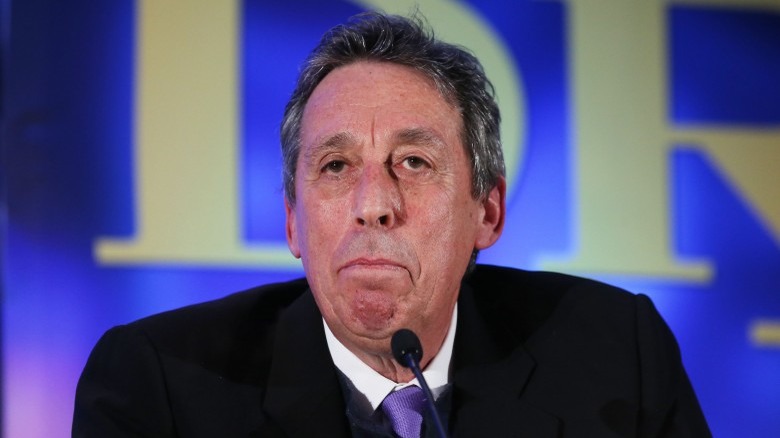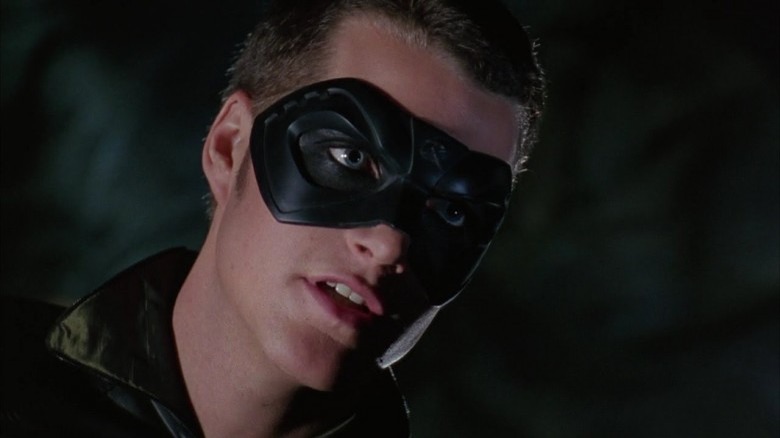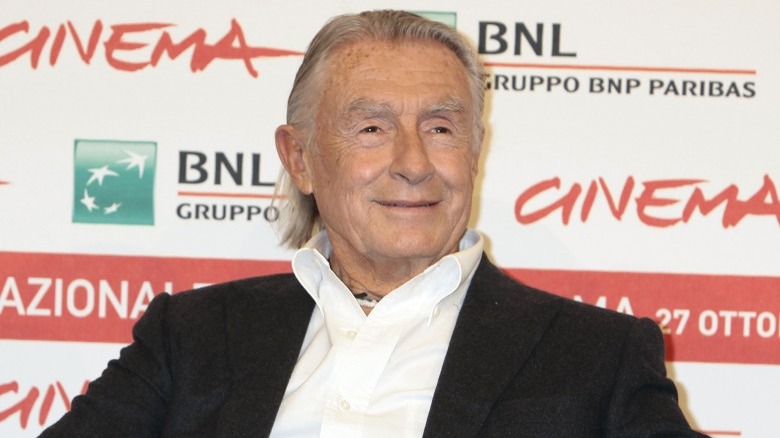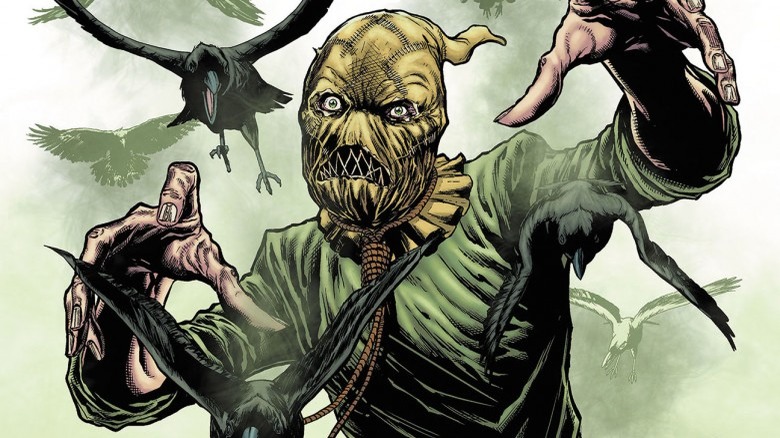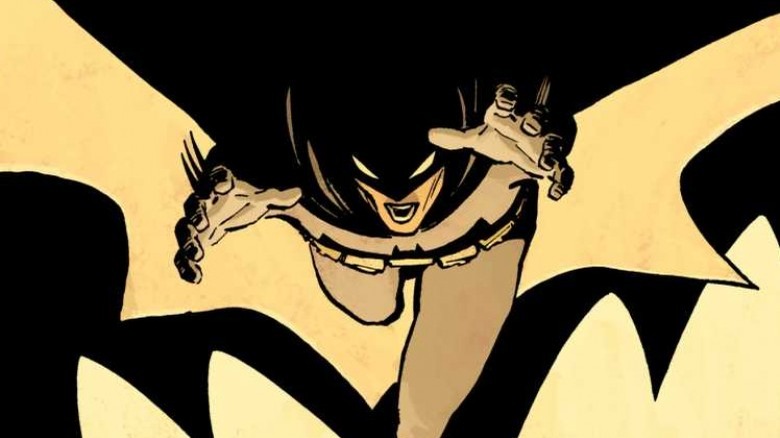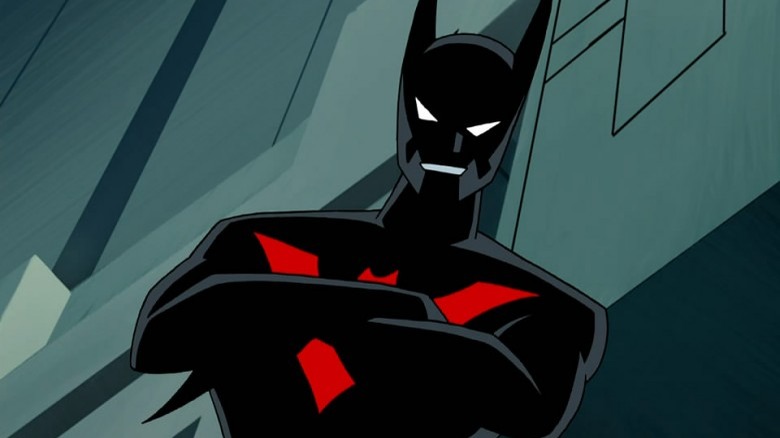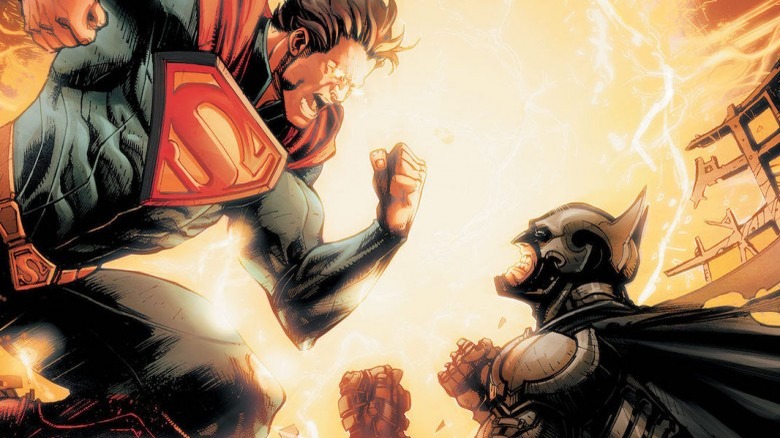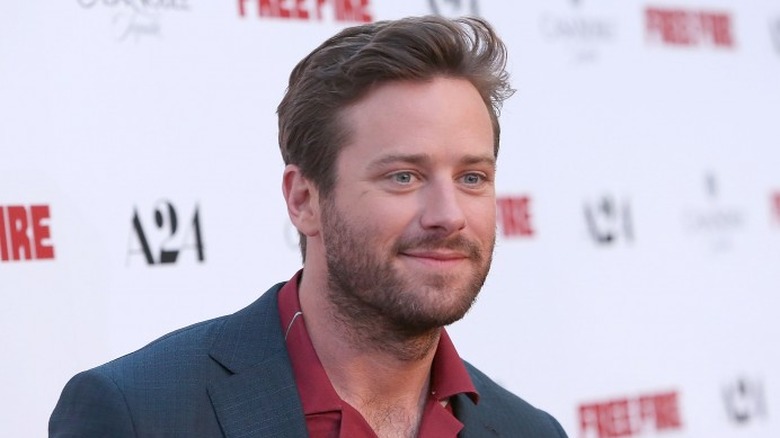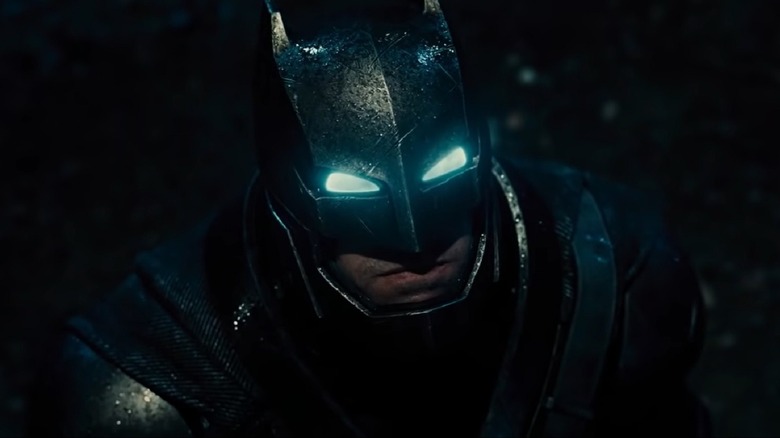Canceled Batman Movies We Never Got To See
To say that Batman has had a pretty good run on the big screen would be putting it mildly — after all, the Caped Crusader's film saga ranks among the top ten highest-grossing movie franchises in the United States. But he's also faced his share of setbacks along the way. For every Bat-blockbuster that made its way to theaters, there's a take on the character that started out strong, only to die in development. Here's the history behind every one of those canceled Batman movies.
The Batman
Getting Tim Burton's 1989 "Batman" onto the big screen was a long and arduous process. Ten years before Michael Keaton made his debut as the Caped Crusader, producers Benjamin Melniker and Michael Uslan acquired the film rights to Batman so they could adapt the character in the same vein as Warner Bros.' "Superman" series. They wanted to have a "definitive, dark, serious version of Batman" on film, and producers Jon Peters and Peter Guber agreed when they boarded the project in November 1979. Four years later, the producers finally had their script, titled "The Batman." Written by Tom Mankiewicz, the story focused on Batman and Robin's origins, with the Joker as the central villain.
Over the next few years, several writers and directors, including Joe Dante and Ivan Reitman, were approached for the project, with each filmmaker bringing their own ideas to the table. In the end, thanks to the success of "Pee-Wee's Big Adventure," the studio hired Tim Burton to direct. Burton felt the existing treatment was too similar to "Superman" and would be better fitted for a TV series, so he changed virtually every aspect of the movie. While they didn't get everything they wanted, the producers still got their dark, albeit campy, version of Batman on the silver screen. It just took a decade to make it happen.
Technically, the studio never canceled "The Batman," though it changed hands so many times that the story, and the production, became almost unrecognizable along the way. Plus, it's the nature of Hollywood to repurpose old ideas into new ones. For instance, the inspiration for the first Batman film came from "Superman: The Movie," while the inspiration for "Smallville" came from a canceled Bruce Wayne TV series. See? Hollywood loves to recycle ideas.
Robin spinoff
When he joined the franchise as Robin for 1995's "Batman Forever," Chris O'Donnell seemed poised for a long run as the character, and for a little while, the plan looked like it was working: he returned for the fourth installment, 1997's "Batman & Robin," and planned to reprise his role in a possible fifth film, though those plans never came to fruition. Along with a proposed sequel, Warner Bros. briefly pursued a Robin spinoff as well, something O'Donnell confirmed as recently as 2012 (yeah, people still ask him about Robin). As he told Access Hollywood, "they were going to do [a Robin movie] back in the day. Then ["Batman & Robin"] was such a bomb, they were like, 'Scrap that!' That was the end of that."
Batman Unchained
Before "Batman & Robin" arrived in theaters, director Joel Schumacher revealed he'd already agreed to keep the reins for another sequel. As he told Variety, he'd always planned to make three Batman movies, and felt a responsibility to the cast. "I asked these actors to be in these movies, and I wouldn't just say thanks a lot, I'm moving on," said Schumacher. "That would be unethical and not attractive." Unfortunately for everyone involved in Schumacher's Bat-saga, "Batman & Robin" tanked, sending the franchise into years of development hell.
The problems started long before that, however. First, Akiva Goldsman, who wrote the screenplays for both "Batman Forever" and "Batman & Robin," opted not to return for the next installment. The studio then hired Mark Protosevich in Goldsman's place, who came up with the name "Batman Unchained."
After running through some of the Dark Knight's more famous villains, Protosevich settled on Scarecrow as the central villain, with Schumacher having suggested Nicolas Cage play the fear-inducing character. The director said that after making a family-friendly Batman film, he felt he owed "the Batman culture a real Batman movie," which included diving deep into Batman's lore with characters like Harley Quinn.
Plans to release "Batman Unchained" quickly went out the door when "Batman & Robin" crashed and burned upon release. Changing course completely, Warner Bros. started looking into the idea of making a "Batman Beyond" or "Batman: Year One" film instead.
Batman: DarKnight
While Joel Schumacher was still busy retooling his plans for a fifth "Batman" movie, writers Lee Shapiro and Stephen Wise pitched the studio their idea for a full reboot. This time, instead of Batman and Robin in their primes, the duo wanted to see Batman retired, with Dick Grayson attending Gotham University.
Shapiro described the plot of the proposed film in a 2005 interview, saying the idea was to have Dr. Jonathan Crane, a.k.a. Scarecrow, be a professor of psychology at Gotham University as well as a resident psychiatrist at Arkham Asylum. He'd exploit his positions to experiment with developing a fear toxin, and "during a vengeful confrontation with a colleague, Dr. Kirk Langstrom, Crane unknowingly initiates Kirk's transformation into the creature known as Man-Bat." After seeing Man-Bat terrorize Gotham, the city's citizens begin to think Man-Bat is actually Batman, prompting the Dark Knight to return from his self-imposed exile to clear his name.
Shapiro said he and Wise pitched their idea to Greg Silverman, a creative executive at the studio. Silverman liked their idea of returning the franchise to its darker roots, and the duo sent their draft over to Schumacher and Tom Lassally, the studio's then-director of development — both of whom had already departed their positions with Warner. Shapiro then sent the script to Lorenzo DiBonaventura, Warners' head of worldwide theatrical distribution, as well as producers Michael Uslan and Benjamin Melniker. They all liked the script, but in the end, it was Lassally's replacement, Jeff Robinov, who passed on the movie.
Batman: Year One
While Warner Bros. toyed with the idea of "Batman: DarKnight," Schumacher was knee-deep in retooling his "Batman & Robin" sequel into a full reboot, one based on Frank Miller's groundbreaking story arc "Batman: Year One." Schumacher wanted to give Batman fans a proper adaptation of the Caped Crusader, and "Year One" might have fulfilled that goal — but the studio parted ways with Schumacher and went with "Requiem for a Dream" director Darren Aronofsky instead.
After hiring Aronofsky, the studio bolstered the project's pedigree further by bringing Miller on board to write the script. In an interview with IGN, Aronofsky urged fans to "toss out everything you can imagine about Batman! Everything! We're starting completely anew."
Over time, the studio ended up not liking Miller's version of the script, so they hired the Wachowski siblings of "Matrix" fame to write a treatment. The studio wasn't satisfied with their script either, so they turned to Joss Whedon, who'd created a number of successful Warners properties, including "Buffy the Vampire Slayer." Whedon's take had yet another different tone, which also didn't pass muster with the studio, and they finally ended up shelving the idea altogether in 2002.
Batman Beyond
Along with considering "Batman: Year One," Warner Bros. also floated the idea of making a "Batman Beyond" film inspired by the hit animated show of the same name, which debuted in 1999. Bruce Timm and Paul Dini's series featured Terry McGinnis, a teenaged vigilante who had taken over the mantle of Batman under the tutelage of a retired Bruce Wayne. The studio's movie division liked "Batman Beyond" so much that they wanted to make a live-action version for the big screen, and hired "Remember the Titans" director Boaz Yakin to helm the project, with Dini writing the script.
At the time, sources told Variety that a "Batman Beyond" film didn't interfere with Warner Bros.' plans to continue with a fifth "Batman" movie — or "Batman: Year One." That changed quickly, however: by August 2001, Dini told attendees at Wizard World in Chicago that the studio had shelved the live-action adaptation indefinitely. What's more, later that year, WB Animation canceled the "Batman Beyond" animated series. That doesn't mean people have forgotten, though.
Batman vs. Superman
Long before Zack Snyder's "Batman v Superman: Dawn of Justice" hit the big screen and set the foundation for the entire DC Extended Universe, Warner Bros. planned to pit the DC Universe's two biggest heroes against each other in the early 2000s.
In 2001, J.J. Abrams wrote the script for "Superman: Flyby," with McG scheduled to direct. The director later dropped the project in favor of "Charlie's Angels: Full Throttle," and the studio hired Brett Ratner as his replacement. After a few more twists and turns, including a period in which Robert Downey Jr. looked like he was going to play Lex Luthor, "Superman: Flyby" was shelved in favor of Bryan Singer's "Superman Returns."
Sometime in between "Flyby" and "Returns," the studio considered Andrew Kevin Walker's pitch for a "Batman vs. Superman" movie, which would have seen Batman come out of retirement, shortly after his wife's death, and join a recently-divorced Superman — until they were duped by Lex Luthor into fighting each other. Sound familiar? Goldsman — returning to the franchise after writing "Batman Forever" and "Batman & Robin" — revised Walker's script in 2002, which was enough to convince Warner Bros. to move forward with the project.
Wolfgang Petersen intended to direct "Batman vs. Superman" in 2003, with a planned 2004 release — and then Abrams jumped back on the scene with a new script for "Flyby." According to Petersen, then-studio chief Alan Horn "was so torn, because it's such a fascinating concept to do a "Batman vs. Superman" film. And I still think it would be to do that. But the studio decided to try separate versions of Superman and Batman." As a result, instead of "Batman vs. Superman," audiences eventually got "Batman Begins" and "Superman Returns."
Justice League: Mortal
Besides their never-ending thirst for Batman movies, comic book readers had been waiting to see the Justice League on the big screen for decades. After canceling plans for "Batman vs Superman," then-Warner Bros. boss Alan Horn thought it was best to pursue separate Batman and Superman films before eventually bringing the heroes together in another project later on. Along with "Batman Begins" and "Superman Returns," the studio was planning a Joss Whedon-directed "Wonder Woman" movie as well as a flick based on "The Flash," written by David S. Goyer. But instead of pursuing separate films first, similar to how the Marvel Cinematic Universe operates, Warner Bros. decided to dive head first into a "Justice League" movie.
Written by Kieran and Michele Mulroney, "Justice League: Mortal" was to be helmed by director George Miller. Its cast included D.J. Cotrona as Superman, Armie Hammer as Batman, Megan Gale as Wonder Woman, Adam Brody as the Flash, Common as Green Lantern, and Teresa Palmer as Talia al Ghul, with Jay Baruchel playing the villain Maxwell Lord. Cameras were ready to roll, but the writers' strike of 2007/2008 put a damper on the movie — and then the overwhelming critical and commercial success of Christopher Nolan's "The Dark Knight" convinced Warner Bros. to pursue individual films instead, making "Justice League: Mortal" the Justice League movie that never was.
Ben Affleck's The Batman
In July 2015, Deadline reported that Ben Affleck and DC head honcho Geoff Johns were set to co-write a standalone Batman movie centered around the DC Extended Universe version of the Caped Crusader. Warner Bros. officially confirmed the project (via The Guardian) shortly after the release of "Batman v Superman: Dawn of Justice," revealing that Affleck had signed on to direct. The movie was slated to be released in 2018 or 2019. Johns later confirmed that Joe Manganiello's Deathstroke would be the movie's villain in an interview with The Wall Street Journal.
Of course, none of this ever happened. According to Collider, Affleck stepped away from the director's chair in 2017 before giving up the coveted Batman role in January 2019 — he later cited problems on the set of "Justice League" and struggles with alcoholism as the reasons for his departure. Affleck's Batman project, a James Bond-like action movie that would have been set predominantly in Arkham Asylum, was subsequently reworked when a new director came on board: Matt Reeves. In January 2022, the filmmaker told Esquire Middle East that Affleck's movie "was very deeply connected to the DCEU, with other major characters from other movies and other comics popping up. I just knew that when I read it this particular script was not the way I'd want to do it."
Reeves approached Warner Bros. and suggested a more Batman-centric story. To his surprise, the execs agreed, and, by 2019, Robert Pattinson had been cast as the new Batman. The rest, as they say, is history.
